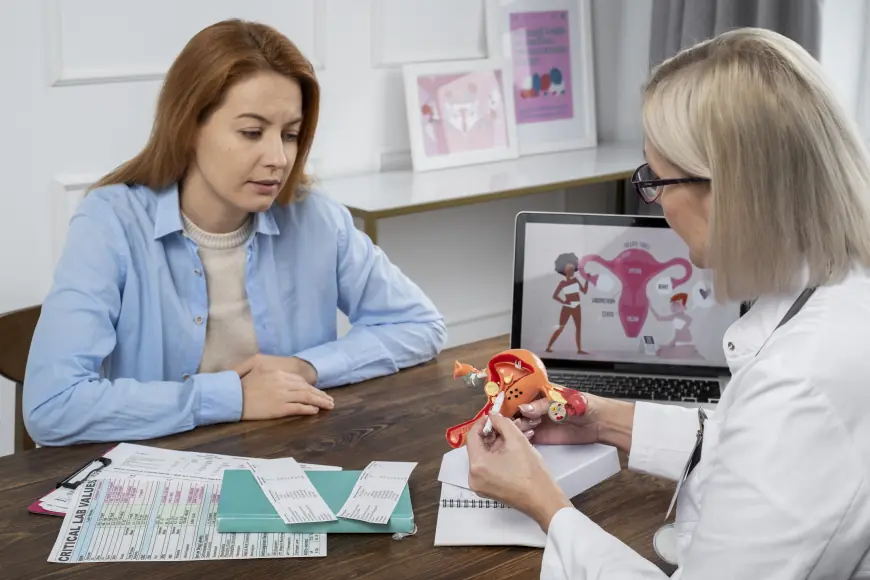What Should You Expect During Your First Gynecology Consultation?
Curious about what happens during your first gynecology consultation? This blog offers a clear, step-by-step guide to help you prepare. From the questions doctors ask to possible exams and tests, learn what to expect and how to make the most of your visit whether you're a teen, adult, or planning a family.

Visiting a gynecologist for the first time can feel intimidating, especially if you’re not sure what to expect. Whether you're going for a routine check-up, facing specific symptoms, or have questions about reproductive health, your first consultation is an important step toward taking control of your well-being.
Understanding what happens during your initial gynecological visit can help ease any anxieties and ensure you get the most out of the experience. This blog will walk you through each stage of a typical first-time gynecology consultation covering everything from the types of questions you may be asked to the kinds of examinations that might be performed.
Why First-Time Gynecology Visits Matter
A first visit to the gynecologist sets the foundation for lifelong reproductive health. It helps you understand your body better and builds a relationship with a medical professional who can guide you through many important life stages—from menstruation and contraception to pregnancy and menopause.
In general, the American College of Obstetricians and Gynecologists (ACOG) recommends that girls have their first gynecology visit between the ages of 13 and 15, or when they become sexually active—whichever comes first.
However, it’s never too late to schedule your first visit. Adults who have never seen a gynecologist are encouraged to do so, especially if they’re experiencing abnormal periods, pelvic pain, unusual discharge, or are planning to start a family.
Preparing for the Appointment
To make the most of your visit, some basic preparation goes a long way:
-
Track your menstrual cycle: If applicable, make note of when your last period started, how long it lasted, and whether your cycle is regular or irregular.
-
List your symptoms or concerns: Write down any discomfort, pain, or issues you’ve been experiencing, no matter how minor they may seem.
-
Know your medical history: Be ready to share details about your general health, past surgeries, allergies, and any medications or supplements you're taking.
-
Be open and honest: The more information your gynecologist has, the better they can help you. This includes being candid about sexual activity, contraception use, and lifestyle habits like smoking or alcohol consumption.
You may also want to bring a notepad or use your phone to take notes during the consultation.
What Happens During the Consultation
Your first visit typically involves three main parts: a conversation, a physical exam (if needed), and discussion of next steps. Each part is important and designed to give your doctor a full picture of your health.
1. Health and Lifestyle Discussion
The consultation often begins with a detailed conversation. The gynecologist or nurse will ask questions such as:
-
When did you have your first period?
-
Are your periods regular or painful?
-
Are you sexually active?
-
Do you use any form of birth control?
-
Do you experience any pelvic pain, discomfort during sex, or abnormal discharge?
-
Have you ever been pregnant or are you planning to conceive?
These questions help the doctor understand your reproductive health and assess any potential risks or conditions.
2. Physical Examination
Depending on your age, medical history, and symptoms, a physical exam may or may not be conducted during your first visit.
General physical check-up: This includes measuring your height, weight, and blood pressure.
Breast exam: The doctor may check for any lumps or abnormalities. They’ll also show you how to perform a self-exam at home, which is a valuable lifelong skill.
Pelvic exam: This part may sound daunting, but it’s quick and typically painless. It involves three parts:
-
External exam: Inspection of the vulva for signs of irritation, cysts, or infection.
-
Speculum exam: A small device is used to gently open the vaginal walls so the doctor can examine the cervix. If you're 21 or older, a Pap smear may be done during this step to screen for cervical cancer.
-
Bimanual exam: The doctor inserts two gloved fingers into the vagina while pressing on the abdomen to feel the uterus and ovaries.
You always have the right to ask questions or request that a female chaperone be present during these exams.
3. Tests and Screenings
Your doctor may order or perform certain tests depending on your age and symptoms. These could include:
-
Pap smear
-
HPV test
-
STD/STI screening
-
Urine or blood tests for hormone levels or infections
They will explain why each test is being done and what the results may indicate.
Emotional Comfort and Consent
A good gynecology hospital prioritizes both physical and emotional comfort. You should feel respected and safe throughout the consultation. Consent is critical; nothing should be done without your permission, and all procedures should be explained before they begin.
If you feel uncomfortable at any time, it’s okay to speak up or ask for the process to slow down. Your doctor is there to support you, not judge you.
Common Topics Covered During the Visit
In addition to exams, your gynecologist may discuss topics like:
-
Menstrual health
-
Birth control options
-
Sexual health and protection
-
Vaccines like HPV
-
Fertility awareness and planning
-
Menopause (for older women)
They may also offer lifestyle advice related to diet, stress management, and exercise as they pertain to hormonal health.
After the Visit
Once the consultation is complete, your doctor will go over the findings, let you know if any follow-up is needed, and schedule any necessary tests. You might also receive educational materials to read at home.
If you’ve undergone tests like a Pap smear or STI screening, you’ll be contacted with the results. Make sure you know how and when to expect those updates.
Maintaining regular follow-ups—even when you’re feeling healthy is essential. Preventive care is one of the most effective ways to avoid more serious issues later on.
Final Thoughts
Your first gynecology consultation is a key milestone in your healthcare journey. While it may feel unfamiliar at first, it’s a step toward staying informed, protected, and empowered about your reproductive and hormonal health.
Choosing a reputable gynecology hospital with experienced professionals ensures that your concerns are heard and addressed with care. Whether you’re a teenager, a young adult, or a woman entering menopause, these visits provide a safe space to ask questions, share concerns, and make informed choices for your future health.
Remember: Taking care of your body starts with understanding it. And that begins with a simple, honest conversation at your first gynecology appointment.
What's Your Reaction?
 Like
0
Like
0
 Dislike
0
Dislike
0
 Love
0
Love
0
 Funny
0
Funny
0
 Angry
0
Angry
0
 Sad
0
Sad
0
 Wow
0
Wow
0

















































